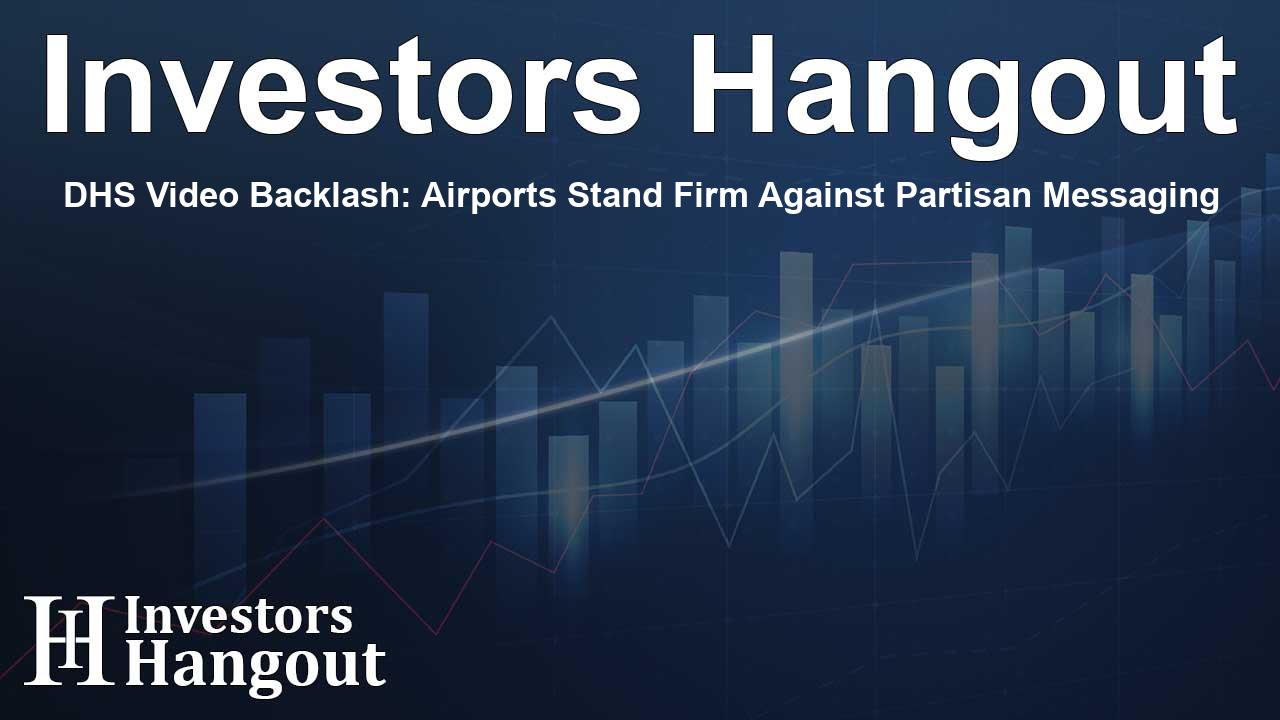DHS Video Backlash: Airports Stand Firm Against Partisan Messaging

Airports Push Back Against DHS Video Directive
Department of Homeland Security Secretary Kristi Noem recently instructed airports to show a video that holds Democrats responsible for delays and disruptions due to the current government shutdown. However, a number of major U.S. airports have pushed back against this directive, stating that it violates both legal and ethical guidelines.
Legal and Ethical Concerns Raised
Officials at a minimum of eight prominent airports have expressed their refusal to comply with the DHS's request. They cite concerns that playing the video, which places partisan blame, would violate federal ethics laws mandating that governmental resources cannot be used for political advocacy on public property. The directive is seen as a direct misuse of public assets for political messaging.
Response from Airport Officials
The dilemma intensified as officials from Portland International Airport and others articulated that airing any part of this video could undermine public trust in their services. A representative from Portland emphasized the significance of adhering to the Hatch Act, which prohibits federal employees from engaging in political activities while on duty.
Noem’s Message and Its Controversy
In her video, Noem states, "Democrats in Congress refuse to fund the federal government and because of this, many of our operations are impacted." The DHS's suggestion to air this politically charged 30-second clip alongside standard public service announcements has stirred considerable debate about the appropriateness of such communications during a shutdown.
Government Shutdown’s Broader Impact
The government shutdown began as a result of lawmakers failing to agree on a funding bill. This impasse has resulted in the suspension of numerous non-essential federal operations, consequently leaving countless employees without pay. Democrats maintain that any agreed funding must continue to support subsidies under the Affordable Care Act, with concerns that cutting these subsidies would dramatically increase health premiums across the nation.
Partisan Messaging Comparisons
Noem’s attempts to utilize the shutdown situation for political messaging echo previous complaints regarding the use of official federal channels for partisan ends. Just before this shutdown started, the Department of Housing and Urban Development faced backlash over displaying a politically charged message on their website, which many viewed as a breach of the Hatch Act's provisions.
Warnings from Ethics Experts
Experts in governmental ethics have raised alarms regarding these actions. Implicit in their warnings is the potential for severe repercussions if the Hatch Act is deemed violated, as it restricts federal workers from engaging in partisan activities during their official duties. Notably, previous administrations have typically avoided assigning blame in their messaging related to government shutdowns.
A Shift in Communication Strategy
Comparatively, previous approaches to explaining government shutdowns have often maintained a nonpartisan tone. For instance, during the 2013 shutdown, President Barack Obama issued a non-confrontational letter to federal workers, explaining the situation without attributing fault to any specific political group. In stark contrast, Noem's video distinctly diverges from this established standard.
Airport Operations Amidst Political Turmoil
Amid this turbulence, airlines such as American Airlines (NASDAQ:AAL), Alaska Airlines (NYSE:ALK), Delta Air Lines (NYSE:DAL), and Southwest Airlines (NYSE:LUV) face significant disruptions resulting from the ongoing political impasse. Reports indicate that these airlines, along with others, have noted increases in delays and cancellations amidst severe weather conditions compounded by the government shutdown.
Conclusion: Navigating the Fallout
The refusal from airports to air the DHS's politically charged video highlights the pervasive struggle between governmental power and ethical public communication. With rising tensions due to this shutdown, the forging of trust between governmental entities and the public hangs in the balance. The aviation sector, already grappling with delays and cancellations, continues to navigate the complexities of this political crisis.
Frequently Asked Questions
What prompted the DHS to request airports air the Noem video?
The DHS aimed to highlight the impact of the government shutdown and blame Democrats for related disruptions.
Which major airports rejected the DHS video directive?
Portland International Airport and at least seven others have refused to comply with airing the video.
What are the implications of airing partisan messages in public spaces?
Such actions may violate federal ethics laws that prohibit the use of public resources for political purposes.
How has the government shutdown affected airlines?
The shutdown has led to increased delays and cancellations across several major airlines.
What does the Hatch Act entail?
The Hatch Act restricts federal employees from participating in political activities while performing their official duties.
About The Author
Contact Olivia Taylor privately here. Or send an email with ATTN: Olivia Taylor as the subject to contact@investorshangout.com.
About Investors Hangout
Investors Hangout is a leading online stock forum for financial discussion and learning, offering a wide range of free tools and resources. It draws in traders of all levels, who exchange market knowledge, investigate trading tactics, and keep an eye on industry developments in real time. Featuring financial articles, stock message boards, quotes, charts, company profiles, and live news updates. Through cooperative learning and a wealth of informational resources, it helps users from novices creating their first portfolios to experts honing their techniques. Join Investors Hangout today: https://investorshangout.com/
The content of this article is based on factual, publicly available information and does not represent legal, financial, or investment advice. Investors Hangout does not offer financial advice, and the author is not a licensed financial advisor. Consult a qualified advisor before making any financial or investment decisions based on this article. This article should not be considered advice to purchase, sell, or hold any securities or other investments. If any of the material provided here is inaccurate, please contact us for corrections.
